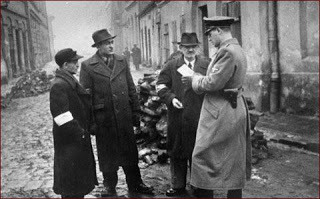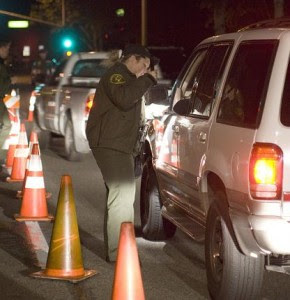Monday, April 26, 2010
The Borders Are Closing In

Ihre papiere, bitte: A defining demand of a police state.
Slavery consists of being “subject to the incessant, uncertain, arbitrary will of another man.”
— John Locke, Second Treatise of Civil Government
When an officer tells you to come inside and sit down, you come inside and sit down…. When an officer tells you to do something, you do it …. There is no “why” here.
— U.S. Border Guard to a befuddled Canadian citizen arbitrarily detained while trying to visit a shopping mall in Niagara Falls, New York.
Returning to his home in Toronto following a brief visit to the States last December, author Peter Watts had the misfortune of being “randomly selected” for a search by members of the Regime’s Border Guards Directorate stationed at the Blue Water Bridge in Port Huron, Michigan.
The science fiction novelist’s bad luck was exacerbated by a momentary miscommunication: He saw a “flicker of motion” outside his car that he assumed was a wave, rather than a demand to pull over. His passenger understood what was happening, and urged Watts to pull over — which he did.
“When I go like this, I’m not waving hello,” sneered the border guard, assuming the snarky tone of unmerited superiority that armed functionaries use when addressing Mundanes.
“I guess we’re not in Canada, because sometimes that means `hello,'” Watts replied, thereby committing a potentially fatal offense called “contempt of cop.”
He compounded that supposed sin by getting out of the car and asking what the guards were doing as they pawed through the luggage in his trunk and the bags in his back seat.
As a citizen of the freest country (by default) in North America, Watts made the critical error of assuming that he had the right to ask why his privacy was being invaded, and that his question would be answered. His question was answered with repeated demands that he get back in his car.
After Watts hesitated, one of the guards seized his arm. This provoked a predictable “flinch response” from Watts, who pulled his arm away.
For reasons that make perfect sense to those attuned with Kafka’s sense of reality, American law enforcement officers often construe the act of pulling away from their unwanted physical contact as a form of “assault” — and thus as a pretext for the summary administration of “street justice.”
First two, and then eventually three, of the stalwart guardians of our sacred northern frontier took turns pummeling the slender, mild-mannered 52-year-old man. Watts was punched, kicked, pepper-sprayed, handcuffed, then thrown wet and partially disrobed into an unheated cell. He was then interrogated, held overnight, and charged with “assaulting a federal officer” after being denied access to legal counsel (and pestered repeatedly to repudiate his Miranda rights).
After Watts’ computer, flash drives, and loose-leaf notebook were confiscated, he was unceremoniously dumped — in shirtsleeves, without so much as a windbreaker — on the Canadian side of the border.
Ironically, in his novel Maelstrom, Watts — a Hugo nominee who specializes in dystopian fiction — appears to have anticipated his experience. Describing the abuse suffered by a character at the hands of customs officials, Watts observes: “Technically, of course, it was not an assault. Both aggressors wore uniforms and badges conferring the legal right to beat whomever they chose.”
A jury of dutiful collectivist drones found Watts guilty of the supposed crime of “non-compliance with a border guard”; his “crime,” reduced to its essence, was to ask, “why?”
Although Watts could have been forced to spend years as part the world’s largest prison population, the presiding judge was content to pilfer $1,628 from the victim of the assault at the border — after treating him to a patronizing lecture about the need to be “nice” to the feral armed adolescents who constitute the State’s punitive caste.
Watts’ experience leaves a decidedly totalitarian aftertaste. Crossing the border of a totalitarian state — in either direction — is an experience fraught with visceral anxiety. Finding himself in the unwanted company of humorless, heavily armed goons of questionable competence and dubious intelligence, the traveler is vividly aware that he can be arrested, imprisoned, beaten, or even shot at whim.
The best thing to do in such circumstances, travelers are told, is to assume a posture of utter servility, meekly and quietly enduring whatever indignity inflicted on them until they are safely through the checkpoint. In coming years, it most likely won’t be necessary to visit the border in order to have a sample of what Watts endured; experiences similar to his will become increasingly commonplace for citizens and other residing legally within the United States.
Is it easier to build a police state from the inside out, or from the outside in? We may never know, since the architects of the Homeland Security State are doing both simultaneously.
Whenever a society descends into totalitarianism, the ruling clique will eventually close the borders — not just to prevent contamination by politically troublesome foreign influences, but also to prevent the egress of refugees and (most importantly) the flight of capital to more congenial economic environments.
In our case, the invasive and arbitrary powers exercised by in the name of border security are becoming embedded in routine law enforcement within the interior. Although the geography of the contiguous 48 states remains unchanged, there is a very real sense in which the borders are closing in on us.
The Border Patrol — the kind folks who treated Mr. Watts to a dose of uniquely Amerikan hospitality — already carries out warrantless, suspicionless checkpoints as far as 100 miles inside the national boundary. The Department of Homeland Security insists that the Fourth Amendment proscription of “unreasonable searches and seizures” doesn’t apply to “border enforcement” searches. This would mean that the two-thirds of the U.S. population living within 100 miles of an international border are residents of a “Constitution-Free Zone.”
Tragically, the expansion of the immigration control “Constitution-Free Zone” is being propelled by some of the most outspoken critics of “big government.”
Last week, many (by no means all) adherents of the Tea Party movement briefly suspended their campaign against invasive government to promote and applaud the enactment of a measure turning Arizona into an authentic police state — that is, one in which police can demand identity papers from practically anyone and arrest those who don’t comply.

An ill omen: This billboard was photographed in Arizona by libertarian activist Ernest Hancock
Under SB 1070, signed into law by Gov. Jan Brewer on April 24, any “lawful contact” between a law enforcement officer and a citizen can end with the latter being arrested and detained if he cannot satisfy a “reasonable suspicion” that he is in the country without official permission.
An incident that occurred two days before that law was signed by Brewer demonstrates that a valid driver’s license may not be sufficient to allay that suspicion, and that it’s entirely possible for a native-born U.S. citizen who fully cooperates with the police to end up being handcuffed, arrested, detained and humiliated.
On April 22, an Arizona resident who identifies himself as Abdon (he hasn’t chosen to disclose his surname) pulled his truck into a weigh station. As his vehicle was being inspected, Abdon was asked by an official to display proof of legal residency. He promptly handed over a valid Arizona commercial driving license; he also supplied his Social Security number and additional personal details.
For some reason this was considered insufficient, and Abdon ended up being cuffed and hauled away to an ICE detention facility while his wife — who was dragged out of work — was dispatched to their home to retrieve Abdon’s birth certificate and other documents.
The unfortunate truck driver’s birth certificate listed his birthplace as Fresno, California. This means that he — unlike one, or possibly both, major party candidates in the last presidential election — has an unassailable claim to being a “native-born United States citizen.” He had complied with every demand made of him at the weigh station, and did nothing to suggest that he harbored criminal intent of any kind.
The only source of the “reasonable suspicion” that led to Abdon’s arrest was his visible ethnicity. This is the standard under which American citizens (particularly, but not exclusively, of Latino ancestry) can now be harassed, arrested, and detained in the State of Arizona.
The more frequently this kind of thing happens, the likelier it becomes that innocent people will be seriously hurt — as if being accosted, questioned, and detained by armed strangers for reasons beyond one’s control weren’t sufficient injury.
SB 1070 has been the equivalent of a public works project for the “tolerance” industry, which is busy planning boycotts and other expressions of punitive sanctimony against Arizona. This had the predictable, albeit unfortunate, effect of leading at least some honorable people of goodwill to assume the best about the measure without examining its impact on individual liberty.
Every invasion of individual rights
happens with the eager support of people acting in the sincere and thoroughly mistaken confidence that what they permit the state to do to others will never be done to them.
The seminal error is to insist on exceptions to the principle that government — assuming, of course, that one should be permitted to exist — must be strictly limited to protecting the life, liberty, and property of every individual.
When that error is coupled with a fertile topic of public concern — such as terrorism, drug addiction, child abuse, or illegal immigration — politics becomes pregnant with large-scale abuses of individual rights.
Supporters of the Arizona immigration law define the controversy as an issue of “sovereignty” — preservation of Arizona’s reserved powers under the Tenth Amendment and the national independence of the United States. Political sovereignty, valuable as it is, must be regarded as a “good of second intent” — something that, while of great worth, is derivative of, or subordinate to, a much greater good. The paramount political good, according to America’s founding premise, is individual liberty protected by law.
In dealing with immigration, as with all other matters of public concern, government’s only legitimate role is to protect individual rights against criminal aggression — such as crimes of violence, fraud, or trespassing on private property.
Current policy, however, is to abet and reward aggression in the form of participatory plunder by illegal immigrants by way of welfare subsidies, which obviously have to be abolished (and not just for immigrants, but for everyone — beginning with the corporate welfare whores on Wall Street and in the military-industrial-homeland security complex).
Enactment of Arizona’s “your papers, please” legislation — which, Judge Andrew Napolitano predicts, won’t survive constitutional scrutiny — comes at a time when the problem of illegal immigration is in remission, both in that border state and nation-wide. It’s entirely likely that with immigration beginning to taper off, the border enforcement apparatus being built today will increasingly be directed inward.
As the government consummates its transformation into an undisguised corporatist kleptocracy, many Americans seeking to preserve some portion of what they have earned and saved will be driven to expatriate themselves.
The Regime already treats Americans living abroad as tax slaves, irrespective of their current place of residence. Economist Doug Casey warns that currency export controls are all but inevitable — indeed, in a small but significant way, they are already a tangible reality.
Many of Obama’s conservative critics simultaneously condemn him for building an invasive collectivist state and for his inadequate zeal in closing down the border. If their perception of Obama’s intentions is sound, those critics had better hope and pray that he doesn’t reverse course and become a border control zealot.

Dum spiro, pugno!
Content retrieved from: http://freedominourtime.blogspot.com/2010/04/borders-are-closing-in.html.






























